My Granada Experience Past Review
By Katrina L (Teacher Education by Level, Southwest Baptist University) - abroad from 05/27/2014 to 07/18/2014 with
AIFS: Granada - University of Granada and Internship Program
I learned to be more confident and independent. I learned to go with the flow and be okay with a change of plans and a change of lifestyle.
Review Photos
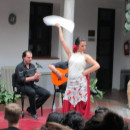
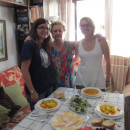
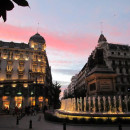
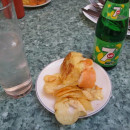
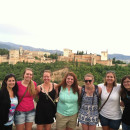
Personal Information
| How much international exposure did you have prior to this program? | 6 months+ |
Review Your Program
|
* Overall educational experience
Academic rigor, intensity, resources, etc. |
I had studied abroad in in high school (in Ecuador) where I learned Spanish more by experience. In Spain I had the opportunity to learn it in class (as well as out and about), and since I knew it pretty well by the time I studied in Spain I got placed in a pretty advanced class. This class taught me things I always wished I knew in Spanish without knowing exactly what I needed to learn. For example, we learned idioms and different ways to say things to make us sound more natural and fancy. |
|
* Host Country Program Administration
On-site administration of your program |
The resident directors in Granada were excellent. They were very knowledgeable about the ins and outs of the program and the city. Every few days they would take us on a cultural excursion around the city if we wanted. They were always there if we needed them or had any questions, but they trusted us and treated us like adults. They encouraged us to travel beyond Granada and get to know Spanish and European culture. |
|
* Housing:
How satisfied were you with your living arrangements? |
I chose to live with a host mom with two other AIFS girls (the other options were to live in a dorm or an apartment). Our host mom was very sweet and a great cook, but she mostly kept to herself. |
| * Food: |
The food in Granada was great. It was especially nice to live in a place where there were free tapas with the purchase of a drink (even non-alcoholic). Almost every day my friends and I would walk around the city and eat tapas and gelato. They say that the Mediterranean diet is one of the healthiest in the world. (Well, maybe not the gelato.. but it is delicious!) |
|
* Social & Cultural Integration:
How integrated did you feel with the local culture? |
Since the program is for American students, a lot of my friends were American exchange students. We probably spoke more Spanish than we should have. However, our resident directors did as much as they could to introduce us to the culture and encourage us to explore it. We would often go for walks around the city after school and see what we could find. |
|
* Health Care:
How well were health issues addressed during the program? |
|
| * Safety: |
As with anywhere in the world, it is smart to be safe and careful. There were a couple times when I was a little uneasy, but for the most part I felt very safe and comfortable. |
| If you could do it all over again would you choose the same program? |
Yes
AIFS was a wonderful program. For everything that it provided it was one of the cheaper options. They went above and beyond in helping us in every way. |
Finances
|
* Money: How easily were you able to live on a student's budget?
(1 = not very easy/$200+ on food & personal expenses/week, 2.5 = $100/week, 5 = very easily/minimal cost) |
It depended on the week. AIFS covered the housing, food, and some cultural excursions. However, some weekends we decided to travel to other parts of the country. These weeks our cost was a lot more. Other than buying bus tickets, most of what I spent money on was food (gelato and tapas), souvenirs, and our own cultural adventures (museums, etc.). There was not a lot I HAD to buy though. |
| Not including program expenses, about how much money did you spend on food and other expenses each week? | $50-$300 (when traveling) |
| Do you have any general money-saving tips for future study abroad participants? | Try not to buy clothes, etc. that you can buy in the States. Make sure the money you spend helps you experience the culture/remember your time abroad. |
Language
| * Did your program have a foreign language component? | Yes |
|
How much did the program encourage you to use the language?
0 = No encouragement, 5 = frequent encouragement to use the language |
They encouraged it, but since there were all levels of Spanish speakers in the program, the resident directors always talked to us in Spanish. |
| How would you rate your language skills at the beginning of the program? | Advanced |
| How would you rate your language skills at the end of the program? | Advanced |
| What was the highest level language course you had completed prior to departure? | College, 2 years, upper level |
| How many hours per day did you use the language? | |
| Do you have any tips/advice on the best ways to practice the language for future study abroad participants? | Get to know the locals in the area as much as you can. Get them to show you their city and where the best spots are that "gringos" may not know about. |
Other Program Information
|
* Where did you live?
Select all that apply |
|
|
* Who did you live with?
Select all that apply |
|
|
* Who did you take classes with?
Select all that apply |
|
| About how many local friends did you make that you will likely keep in touch with? | 0 |
A Look Back
| * What did you like most about the program? |
|
| * What could be improved? |
|
| * What do you know now that you wish you knew before going on this program? | Nothing -- I enjoyed what I learned on the program and I wouldn't have it any other way. All of the challenges and victories were great, but I wouldn't have wanted to know them before. |
Reasons For Studying Abroad
| To help future students find programs attended by like-minded individuals, please choose the profile that most closely represents you. |
The Nearly Native or Trail BlazerCraving the most authentic experience possible, perhaps you lived with a host family or really got in good with the locals. You may have felt confined by your program requirements and group excursions. Instead, you'd have preferred to plan your own trips, even skipping class to conduct your own 'field work.' |








